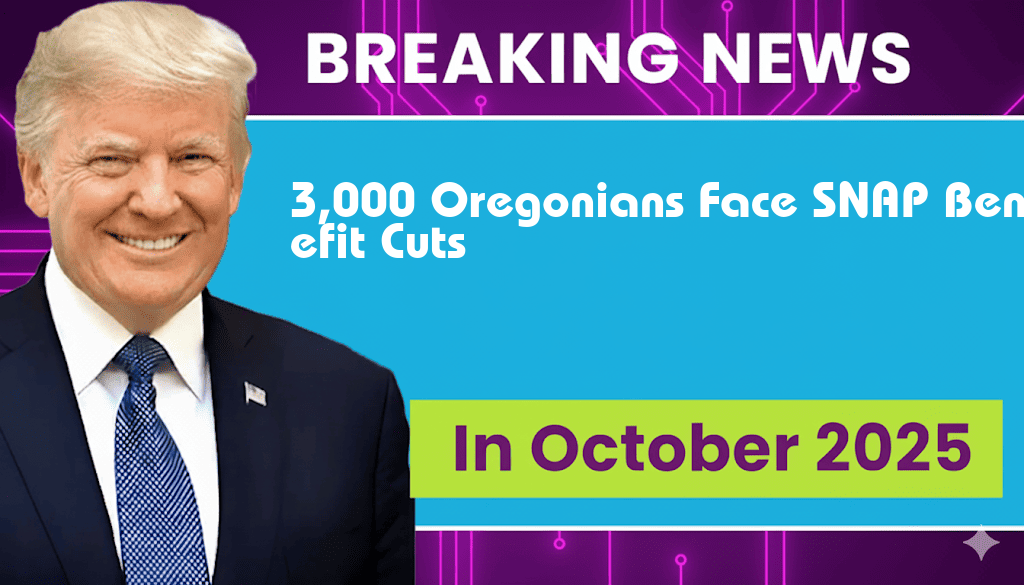More than 3,000 residents of Oregon are facing significant reductions in their Supplemental Nutrition Assistance Program (SNAP) benefits as new eligibility changes come into effect this month. This shift could mean a loss of over $3,000 in assistance for many families, impacting their ability to afford basic necessities like food and household supplies. The changes are part of a broader effort by state officials to recalibrate the program in response to evolving economic conditions, but critics argue that this will disproportionately affect low-income families already struggling to make ends meet.
Understanding the SNAP Changes
The recent adjustments to the SNAP program in Oregon stem from a combination of factors, including federal policy updates and state-level assessments. The Oregon Department of Human Services (ODHS) announced that the new eligibility criteria will tighten the income thresholds for recipients, which will result in reduced benefits for thousands.
Who Will Be Affected?
- Families with incomes exceeding the new thresholds will see benefit reductions.
- Single-person households and seniors on fixed incomes are particularly vulnerable to these changes.
- Those previously eligible for maximum benefits may find themselves receiving significantly less.
Impact on Families and Communities
The implications of these changes are profound. For families already facing financial instability, losing an average of $3,000 in benefits can lead to increased food insecurity. Many families rely on SNAP as a critical resource, and reduced assistance could force them to make difficult choices between basic needs such as groceries and other essential expenses.
Real-Life Consequences
Local food banks and community organizations are bracing for an uptick in demand as more residents may turn to them for support. According to the Oregon Food Bank, they have already begun to see increased foot traffic in their facilities as families seek additional resources. “This change is going to have a ripple effect,” said a spokesperson from the Oregon Food Bank. “We are preparing for more families to need our help.”
Government Response and Future Outlook
State officials maintain that the adjustments are necessary for ensuring the sustainability of the SNAP program in the long run. They argue that the changes will help align benefits with current economic realities. However, community advocates are calling for a reevaluation of these policies, emphasizing the need for support structures that prioritize food security.
Advocacy and Support Initiatives
In response to the changes, advocacy groups have mobilized to assist those affected. Initiatives include:
- Outreach programs to educate families about their options.
- Increased funding for local food banks and community assistance programs.
- Workshops aimed at helping families navigate the new eligibility requirements.
Conclusion
As over 3,000 Oregonians prepare for the financial impact of the recent SNAP eligibility changes, the community and advocacy groups are stepping up to provide necessary support. With the potential loss of over $3,000 in benefits, the road ahead may become increasingly challenging for many families. Ongoing dialogue between state officials and community organizations will be crucial in addressing these pressing issues and finding sustainable solutions for food security in Oregon.
Additional Resources
For more information on SNAP benefits and eligibility, you can visit the following resources:
Frequently Asked Questions
What are the recent changes to SNAP eligibility in Oregon?
The recent changes to SNAP eligibility in Oregon involve stricter income requirements and adjustments to the asset limits, which have resulted in many individuals and families losing their benefits.
How many Oregonians are affected by the SNAP eligibility changes?
Over 3,000 Oregonians are facing a loss of more than $3,000 in benefits due to the newly implemented eligibility criteria.
What is the financial impact of these changes on affected individuals?
Affected individuals may lose significant financial support, with some estimated to lose over $3,000 annually, which can greatly impact their ability to purchase food and meet other essential needs.
Are there any resources available for those losing their SNAP benefits?
Yes, there are several resources available, including local food banks, community organizations, and state assistance programs designed to help those affected by the changes in SNAP eligibility.
What can individuals do if they disagree with their SNAP eligibility determination?
If individuals believe their SNAP eligibility determination is incorrect, they can request a fair hearing to appeal the decision and provide additional information to support their case.



